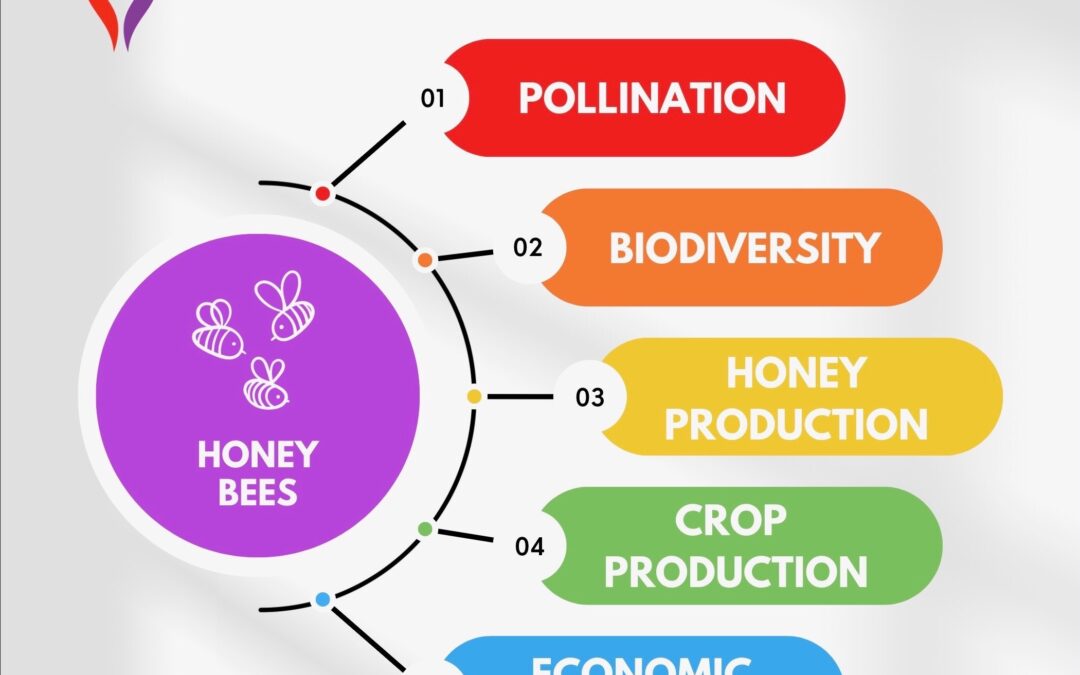A Letter from Lana Greetings to my Rainbow Chefs family! I hope this message finds you in good health and high spirits. It’s with a sense of enthusiasm and responsibility that I write to you today, following an important occasion that just passed. This past Saturday, August 19th, we celebrated World Honey Bee Day, a day dedicated to these tiny, yet incredibly vital creatures that play an indispensable role in our world. Honey bees are often underestimated heroes of our food supply chain, quietly working behind the scenes to pollinate the plants that provide us with nourishment. As we mark this special day, it’s a reminder of the delicate balance in our ecosystem, one that we, at Rainbow Chefs Academy, believe is crucial to understand and appreciate, especially in the context of health, wellness, and nutrition education. In this week’s newsletter, we’ll delve into the world of honey bees and their extraordinary contributions to our food system. We want to continue spreading awareness about their importance and how their role aligns with our mission of educating young minds about health, wellness, and nutrition from K to 12. It’s not just about educating our children; it’s also about saving the bees, for they are the heartbeat of our food system So, please join us on this journey as we explore the vital role of honey bees in shaping what’s on our plates and in our lessons. 🐝🍯🌱 🌈 ❤️ Warmly, Svetlana Elgart CEO / Founder Rainbow Chefs Academy Our mission is to empower children with the knowledge and skill to offset childhood obesity and diabetes in our country.
We will get there… one Rainbow Chef at a time. PS- Do you know we do Events, too? Bay Area residents CLICK HERE |
|
| A Pinch of Wellness 5 Important Roles of Honey Bees 🌼 Pollination: Honey bees are prolific pollinators. They help fertilize flowering plants by transferring pollen from male to female flower parts, facilitating the production of fruits, vegetables, and nuts. Many of the crops that make up a significant portion of our diet, such as apples, almonds, and blueberries, depend heavily on honey bee pollination. 🌿 Biodiversity: Honey bees also contribute to biodiversity by pollinating wildflowers. This helps maintain healthy ecosystems and supports the wildlife that depends on these plants for food and habitat. 🍯 Honey Production: Enjoyed by humans for centuries, honey is not only a valuable food source but also has antimicrobial properties and is used in various traditional and alternative medicinal practices. The lifespan of a worker honeybee is relatively short, typically around 4 to 6 weeks during the summer months. In this short time, a single bee can produce only about 1/12th of a teaspoon of honey. 🌾 Crop Production: The global value of crops that depend on pollinators is estimated to be in the hundreds of billions of dollars annually. Without honey bees, yields of many important crops would be significantly reduced, leading to increased food prices and potential shortages. 💼 Economic Impact: The honey bee industry provides economic opportunities for beekeepers who sell honey, beeswax, and other bee-related products. Additionally, the pollination services offered by honey bees are a significant source of income for beekeepers and play a pivotal role in sustaining agriculture. Honey bees are indispensable and their role in our ecosystems and agriculture underscores the importance of preserving and protecting these vital pollinators. Learn more about the importance of honey bees! |
|
| A Dash of Wisdom 5 Fun Facts About Honey 🍯 Honey Never Spoils: Archaeologists have found pots of honey in ancient Egyptian tombs that are over 3,000 years old and still perfectly edible. Honey’s natural composition, with its low moisture and high acidity, creates an environment that resists spoilage. 🌍 Geographical Varieties: Honey’s flavor, aroma, and color can vary significantly depending on the region where it’s produced. This variation is due to the types of flowers and plants available for nectar collection in different areas. Honey enthusiasts often seek out specific regional varieties to experience unique taste profiles. 🏥 Healing Properties: Honey has been used for centuries for its medicinal properties. It has natural antibacterial and anti-inflammatory qualities, making it useful for wound healing and soothing sore throats. Manuka honey, in particular, is renowned for its potent antibacterial properties. 🌿 Digestive Benefits: Honey has been used for its potential digestive benefits. It may help soothe a sore throat and relieve coughing, and some people find it aids in digestion when consumed in moderation. 🌟 Natural Sweetener: Honey is sweeter than sugar, so you can use less of it to achieve the same level of sweetness. It contains essential nutrients and antioxidants, including vitamins, minerals, and polyphenols. Honey provides a source of energy from natural sugars and can be a healthier alternative to refined sugars when consumed in moderation. Learn more about honey! |


